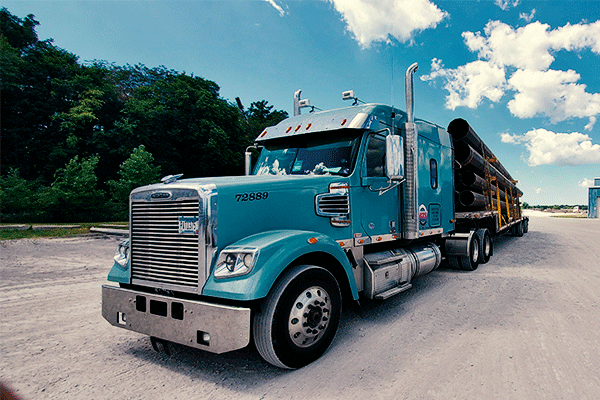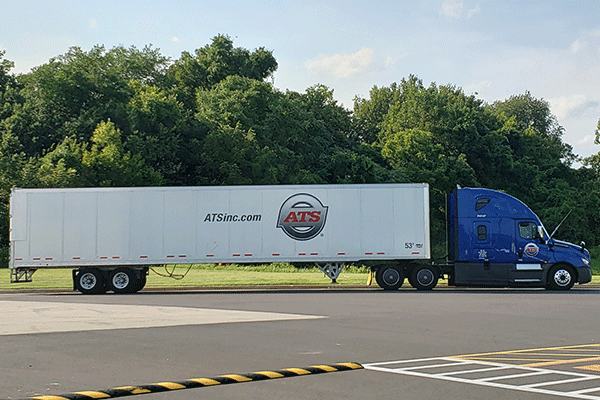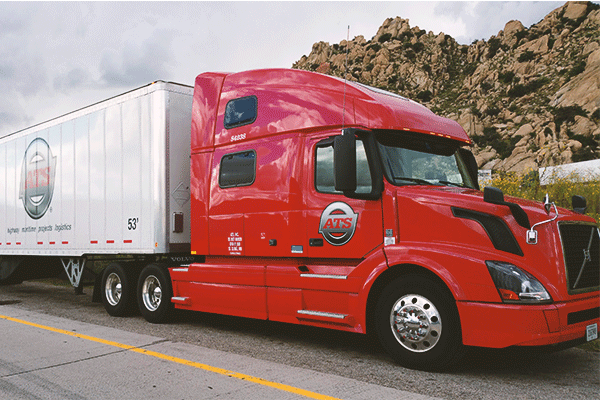
So, your customers route their own freight. To this point, this process has worked well for your business, your customers and your bottom line. You have a specialty, whatever it may be, and providing transportation services isn’t it. Plain and simple.
Sure, you could begin offering transportation services for your products and assist customers after they’ve made their purchase. But you’re just not sure what the benefits would be.
Wouldn’t routing your own freight make your job more difficult and cost you money on each transaction? Isn’t it easier to simply let each customer route their goods and wait for their trucks to show up?
It’s the uneasy feeling questions like these leave you with that keeps you from routing any freight. These fears, worries and concerns are valid and we’re not here to sway you in either direction.
That said, here at ATS, we’ve seen how impactful making the transition to routing their customer’s freight has been for many businesses. As such, we feel it’s important to pass along all of the information needed to make this decision.
In this article, you’ll find a comprehensive breakdown of the advantages and disadvantages of routing freight. The disadvantages, things like routing your own freight requires oversight, expertise and resources, are exactly what you’d expect.
The advantages, though, might surprise you.
Let’s get into it, starting with the downsides of routing your own freight.
What are the Disadvantages of Routing Your Own Freight?
Just like you were afraid of, there are some disadvantages to managing the transportation of your own freight. Prime among them is the fact that getting this process right takes commitment.
If you’re truly interested in adding this to your supply chain, and it makes sense for you to do so, you won’t be able to get away with putting in minimal effort.
Often, companies that ship freight more than two to three times per week find success in routing their own goods.
That said, here are the top three disadvantages of routing freight that you should keep in mind when making this decision.
1. Routing Your Freight Requires Oversight
As you’ll find out — if you begin routing your own products — it takes a steady hand and continuous oversight to see this through.
Whether it’s a truck that breaks down in-route to your customer, causing you to search for a last-minute power-only solution, or a change of plans at your receiver, taking a hands-on approach to managing your freight’s movement is crucial.
Without coming through for your customers by getting them their products when they need them, your reputation for reliability may be at stake.
And, even though working with a competent list of transportation companies will help alleviate this burden, it will still require time and energy on your behalf. As such, if you can’t dedicate the manpower needed to oversee this process, routing your own goods may end up being more trouble than it’s worth.
2. Routing Your Freight Takes Expertise
The transportation industry is complex and transportation professionals are knowledgeable. Without understanding the intricacies of this world, many shippers end up overpaying for their freight and damaging their bottom lines.
Even those who work in this world every day encounter new service offerings, terms and price factors every now and then. It’s no wonder so many companies decide to limit their interactions with the transportation marketplace; it can be downright confusing.
Luckily, there are plenty of great transportation providers that boast an extensive set of expertise and service offerings. These businesses offer shippers, like you, the opportunity to control their supply chains with ease and remove unnecessary confusion from this process.
That said, without guidance from a tried and true provider, companies like yours may find it difficult to make routing freight work for them.
As such, it’s important that you weigh your options and find a transportation partner that will work for you. Anything less simply wouldn’t give your business, your goals and your customers the attentiveness they deserve.
3. Routing Your Freight Takes Resources
The largest deterrent to routing your own freight is a simple one: It costs time and money to make adding this to your service offerings worthwhile. You won’t want to take on the burden of routing the goods your customer’s purchase, or the raw materials coming in your door, without the resources to do so.
Not only does this process demand a fair bit of up-front investment — in the form of load-tracking software and human capital — but it will take time before it pays off.
To maintain your reputation as a company, while in the same breath providing additional value — in the form of freight routing — for your customers, you’ll need a point person.
This should be the individual in charge of overseeing the logistical aspects of your supply chain; scheduling inbound trucks, locating solutions should problems arise, communicating with stakeholders, etc.
If you’re a company with a shipping department, you might be able to get away with adding these responsibilities to a current employee’s plate. If your foreman or another worker has the wherewithal and free time needed to handle this additional responsibility, great.
Otherwise, you’ll need to add an additional employee to your payroll. Someone to fully own the process of routing customer — and inbound (where applicable) — freight.

What are the Advantages of Routing Your Own Freight?
Before you write routing your own freight off as a distant fantasy that you couldn’t possibly make work, let’s dig a bit deeper. Many businesses, just like yours, used to think the exact same way.
“How could dedicating my time and money to routing freight actually pay off?”
“Is this even something that my customers would value?”
“Wouldn’t it make more sense to utilize my time elsewhere?”
These are some of your more pressing questions and each of them is valid. To ease your mind though, let’s talk about the four largest advantages of routing your own products.
1. Routing Your Freight Can Make You Money
As of now, simply getting their purchase to where it needs to end up takes an investment on your customer’s part. And, considering that these companies aren’t exactly transportation experts, they’re probably overpaying to do so.
Think about it: Every time one of your customers buys something from your inventory, the process of finding a third party to move it begins — without the know-how it takes to do so cost-effectively.
But what if you cut out this touchpoint and did it yourself? What if you took control of what can be an inconvenience for them and make it lucrative for you?
I’ll tell you now, you’ll like the outcome.
Not only will this help you add a bit of value to your customer relationships but turn a profit on each transaction as well.
With the right transportation partnerships and a bit of logistical savvy, you’ll be able to make money by routing your own freight. You see, trucking companies enjoy freight that they can count on, freight that comes from businesses they know.
As relationships develop between your company and your transportation providers, competencies will follow. In turn, this mutual understanding — and the efficiency stemming from it — will help you shrink loading times, stick to deadlines and ensure you’re paying the right price for each shipment.
Eventually your new-found efficiency, expertise and relationships — developed through repeat interactions — will help you increase the margin dollars you receive on each load and pad your bottom more than you could’ve imagined.
2. Routing Your Freight Increases Your Control
Without routing your own goods, information on when each truck will arrive at your door must be received from your customers. This can make it difficult to coordinate pick-ups on your schedule and at your convenience.
The transportation of your cargoes is a large portion of your supply chain. I'm sure you’ve experienced this before. Without your oversight, costly delays can occur when:
- A truck shows up late leaving your employees standing around for prolonged periods of time.
- Miscommunication on pick-up hours causes a trucker to layover (which comes at a charge) or fall off your load entirely.
- Information such as a shipment’s width, length, height, weight and exact nature makes it impossible for the booked truck to haul it.
You’re the expert when it comes to your freight. It’s difficult for your customers to find the exact right-fit solution to move your products — products they’re relatively unfamiliar with. Put this expertise to work for you by routing your own freight, ensuring only the best-fit equipment shows up and taking back control of your shipping areas.
Doing so will only help you maximize your supply chain as you keep the right trucks coming in at the right time and leaving with the right freight.
3. Routing Your Freight Adds Value For Your Customers
Even if you’re not routing your customer’s goods, there’s a high likelihood that your competitors are. And, given the choice between paying extra for a product that will be shipped for them and one that won’t, many businesses prefer the former.
As such, if you’re hoping to expand your book of business and grow into the future, routing your own freight is nearly non-negotiable.
In a free-market economy, the truest test of whether a business will be successful long term is that company’s ability to adapt. Their ability to lean into weaknesses and make the difficult decisions.
If you purchase something isn’t it nice when the seller handles the logistics of getting it to you?
The best companies strive to bring as much value to their customer relationships as they can. This means working to surpass all competitors and alternatives.
Routing cargoes from your loading dock to your customer’s door will do just that.
4. Routing Your Freight is Good For Your Reputation
This final point is crucial. The transportation industry is home to hundreds of thousands of trucking companies, freight brokers and 3PLs. With so many options to choose from, there are plenty of bad ones.
Some transportation companies simply aren’t up to snuff as they prioritize turning a profit over quality service and, most importantly, safety.
Routing your freight will give you more control over the carriers that interact with your business. Your goods are of the highest quality, make sure your transportation providers are the same.
Beyond this, asking your customers to select a trucking company from the field — especially if they don’t know what to look for in a good one — can be detrimental to your reputation. Should something go wrong — whether it’s cargo damage, prolonged delays or a more dangerous incident — you can forget about any future transactions with that customer.
Why would they do work with a company that made it so difficult for them to get their freight? It just doesn’t make sense, especially with so many other options to choose from; options that route their own freight.
If you’d like better control over the quality of carriers that move your goods, consider adding this offering to your catalog. Your customers will thank you in the form of repeat business and good reviews. Both of which are the markings of a reputable business.

How to Choose a Good Transportation Provider?
Now that you have the full rundown on the pros and cons of moving your own freight, you understand how impactful this can be for the companies it fits.
In various spots throughout this article, we’ve mentioned the importance of having good transportation companies on your side to get this right. With the right providers in your court, this process won’t feel so daunting at all.
That said, it can be difficult to select a good one — especially if you’ve never done so before.
To help you with this, we invite you to check out these additional pieces of content where we outline many of the things you’ll want to keep in mind.
- 7 Signs to Know You’re Hiring a Stable Transportation Provider
- The Freight Brokerage Selection Common Mistakes Guide
- How Many Transportation Providers Should You Have? (and how to choose)
Choosing your best-fit transportation partner can be difficult but it’s certainly worth the initial struggle. If you have any questions during your own selection process, or would like to know how ATS can help you route your own freight going forward, reach out.
We have a transportation expert ready and waiting to put your needs, your timelines and your supply chain, first.



